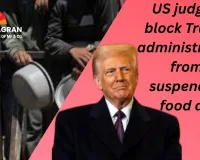Trump Lifts Tariffs on Key Agricultural Products Following Electoral Setbacks
Digital Desk

President Donald Trump on Friday signed an executive order rescinding tariffs on a wide range of agricultural products, including beef, coffee, fruits, and select fertilizers, in a move aimed at easing inflationary pressures and responding to public discontent over rising prices. The announcement comes in the wake of Democratic wins in the Virginia and New Jersey elections, where voters expressed concern over high living costs.
The White House cited escalating inflation as the primary motivation for lifting tariffs, emphasizing that the measure will help stabilize prices and ease the financial burden on American households. The products now exempt from tariffs include beef, coffee, tea, fruit juices, cocoa, spices, bananas, oranges, tomatoes, and certain fertilizers.
Officials highlighted that the decision follows recent trade agreements with Ecuador, Guatemala, El Salvador, and Argentina, which will reduce import taxes on agricultural goods from these countries. Analysts note that lifting tariffs is expected to increase imports of key commodities and provide relief to consumers facing persistent price hikes in food staples such as beef.
The move marks a significant policy reversal after Trump’s initial tariff impositions earlier this year. In April, the administration had announced tariffs on major exporting nations, including Brazil, claiming they would protect domestic interests without impacting consumer prices. Contrary to these assurances, the tariffs contributed to rising costs, particularly in beef and other agricultural products, sparking public backlash.
Mexico, America’s largest agricultural trading partner in 2025, accounts for a substantial share of both exports and imports. According to the USDA, U.S. agricultural exports to Mexico totaled $30.3 billion in 2024, a 7% increase over 2023, with key exports including corn, pork, dairy products, soybeans, and chicken. Imports from Mexico primarily consist of tomatoes, avocados, berries, and other vegetables. The USMCA agreement has further facilitated trade by eliminating tariffs on most Mexican products, boosting bilateral exports by 65% over the past four years.
Despite the rollback, trade tensions persist with other nations. India continues to restrict U.S. dairy imports, citing religious and dietary concerns over milk sourced from cows fed animal-based enzymes. South Korea maintains strict restrictions on beef imports over 30 months old due to concerns about Mad Cow Disease, while Switzerland and Iceland impose high tariffs and provide substantial subsidies to protect domestic farmers.
Economic analysts view the tariff removal as a strategic response by the Trump administration to regain public confidence ahead of upcoming electoral cycles. “This measure directly addresses inflation concerns that influenced voter behavior in Virginia and New Jersey,” said a senior USDA official. “It signals a willingness to recalibrate trade policies in response to domestic economic pressures.”
The executive order is expected to have immediate effects on import flows and domestic prices, providing relief to American consumers while signaling a shift in U.S. trade policy amid rising political scrutiny. The administration will closely monitor market responses and inflation trends as the policy takes effect.











